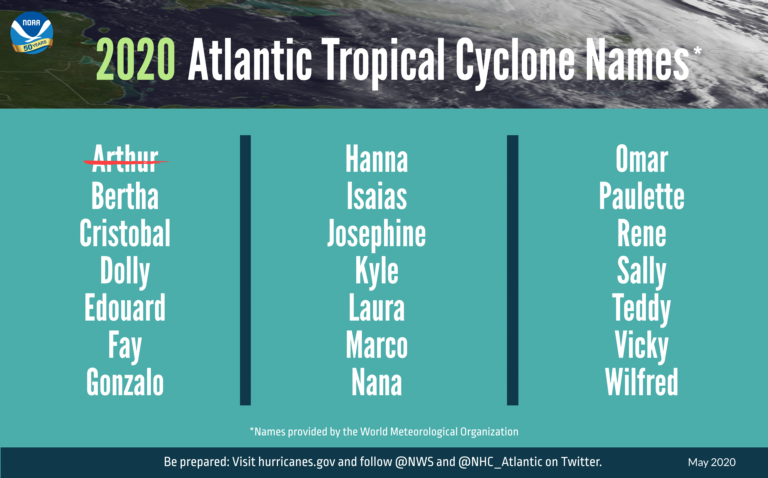NOAA predicts above-normal Atlantic hurricane season, stresses ‘it only takes one’
The National Oceanic and Atmospheric Administration expects an above-normal Atlantic hurricane season amid the global pandemic.

A summary graphic showing an alphabetical list of the 2020 Atlantic tropical cyclone names as selected by the World Meteorological Organization. The first named storm of the season, Arthur, occurred earlier in May before NOAA's outlook was announced. The official start of the Atlantic hurricane season is June 1 and runs through November 30. (Courtesy of NOAA)
The National Oceanic and Atmospheric Administration expects an above-normal Atlantic hurricane season amid the global pandemic.
The outlook, released by NOAA last week, anticipates 13 to 19 named storms, of which six to 10 could become hurricanes and three to six major hurricanes (Category 3 or higher). The federal forecasters say these ranges are made with 70% confidence.
NOAA forecasters say the outlook is based on competing climate factors, citing the absence of the weather pattern El Niño, which suppresses hurricane activity, along with warmer-than-average sea surface temperatures in the tropical Atlantic Ocean and the Caribbean Sea. Reduced wind shear, weaker tropical Atlantic trade winds, and an enhanced west African monsoon are also contributing factors.
“NOAA’s analysis of current and seasonal atmospheric conditions reveals a recipe for an active Atlantic hurricane season this year,” said Neil Jacobs, Ph.D., acting NOAA administrator. “Our skilled forecasters, coupled with upgrades to our computer models and observing technologies, will provide accurate and timely forecasts to protect life and property.”
An average hurricane season produces 12 named storms, of which six become hurricanes, including three major hurricanes, according to NOAA.
The outlook is for overall seasonal activity and not for landfalls, which are only predictable about one week prior to a storm reaching a coastline, according to NOAA. Forecasters remind coastal residents that it only takes one hurricane striking the coast to make it an active season for them.
The COVID-19 pandemic is a complicating factor during the upcoming hurricane season, officials say.
“Social distancing and other CDC guidance to keep you safe from COVID-19 may impact the disaster preparedness plan you had in place, including what is in your go-kit, evacuation routes, shelters and more,” said Carlos Castillo, acting deputy administrator for resilience at FEMA.

Get daily updates from WHYY News!
During a New Jersey briefing on the pandemic last Thursday, State Police Superintendent Col. Patrick Callahan said the state is working with the Federal Emergency Management Agency on coupling hurricane preparedness and any potential response with the ongoing COVID-19 operations.
The colonel listed all of the moving parts the state must manage seamlessly in conjunction with each county emergency management office and the federal government.
“When you think of how a state emergency operations center now has to operate with social distancing and hygiene in mind, when you think about mass care and sheltering upwards of maybe hundreds of people, when you think about possibly having to do virtual damage assessments, instead of FEMA folks and troopers going out to scenes doing that, with one person with cameras and phones and uploading things,” Callahan said.
Some Atlantic basin seasons feature below-average activity but still result in a devastating storm, like Hurricane Andrew in 1992, while others like 2010 — the third most active season on record — did not feature a hurricane making landfall.
The 2020 Atlantic basin hurricane season officially begins on June 1 and continues through November 30. The cyclone names are Arthur (already formed and dissipated), Bertha, Cristobal, Dolly, Edouard, Fay, Gonzalo, Hanna, Isaias, Josephine, Kyle, Laura, Marco, Nana, Omar, Paulette, Rene, Sally, Teddy, Vicy and Wilfred.
NOAA offers a comprehensive guide on storm preparations.
WHYY is your source for fact-based, in-depth journalism and information. As a nonprofit organization, we rely on financial support from readers like you. Please give today.





